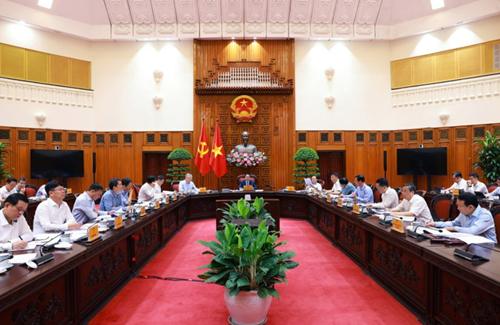This marks the 7th time the Government leader has chaired an exclusive meeting to seek solutions to the U.S.'s new tariff policy, following key directives from the Party Central Committee, the Politburo, and Party General Secretary To Lam.
Vietnam has so far demonstrated a constructive and proactive approach, sending representatives to the U.S. and engaging in numerous discussions to promote balanced and sustainable trade relations. The U.S. has proposed a concrete negotiation schedule, indicating its goodwill in line with commitments made during recent high-level contacts and follow-up working sessions and meetings between the two sides.
    |
 |
|
At the exclusive meeting to seek solutions to the U.S.'s new tariff policy, chaired by PM Pham Minh Chinh in Hanoi on May 6. |
In his conclusion, PM Chinh directed ministries and relevant agencies to focus on countermeasures in response to the U.S.'s reciprocal tariff policy and prepare thoroughly for effective negotiations adhering to the principle of harmonizing interests and sharing risks, and basing on the spirit of ensuring Vietnam’s legitimate and legal rights and interests, especially core interests.
Noting the importance of meeting reasonable expectations from the U.S. side, the government leader underscored that all negotiation outcomes must be consistent with Vietnam’s existing international commitments, adding that the flexibility in scheduling negotiations suitable for both sides is also needed.
In parallel with negotiations, he tasked ministries and sectors involved with addressing the U.S.'s concerns, increasing imports of U.S. goods for which the U.S. has advantages and Vietnam has demand, and simplifying administrative procedures, including VAT and investment-related matters affecting U.S. businesses in Vietnam.
PM Chinh also urged the prompt finalization of a decree on strategic trade control to facilitate the import of hi-tech products from the U.S., and recommended discussions on tariff arrangements that would help more U.S. products enter the Vietnamese market and boost Vietnamese labor-intensive and strong industries’ exports to the U.S.
He stressed the necessity to proactively adapt to global trade challenges by diversifying markets, products, and supply chains; leveraging Vietnam’s 17 existing free trade agreements; and actively pursuing new trade agreements, especially with countries that have recently upgraded diplomatic ties and emerging markets in the Middle East, Africa, and Latin America.
It is important to strengthen the domestic market and enforce stricter monitoring of product origin and trade practices, among other measures, the PM noted.
Source: VNA